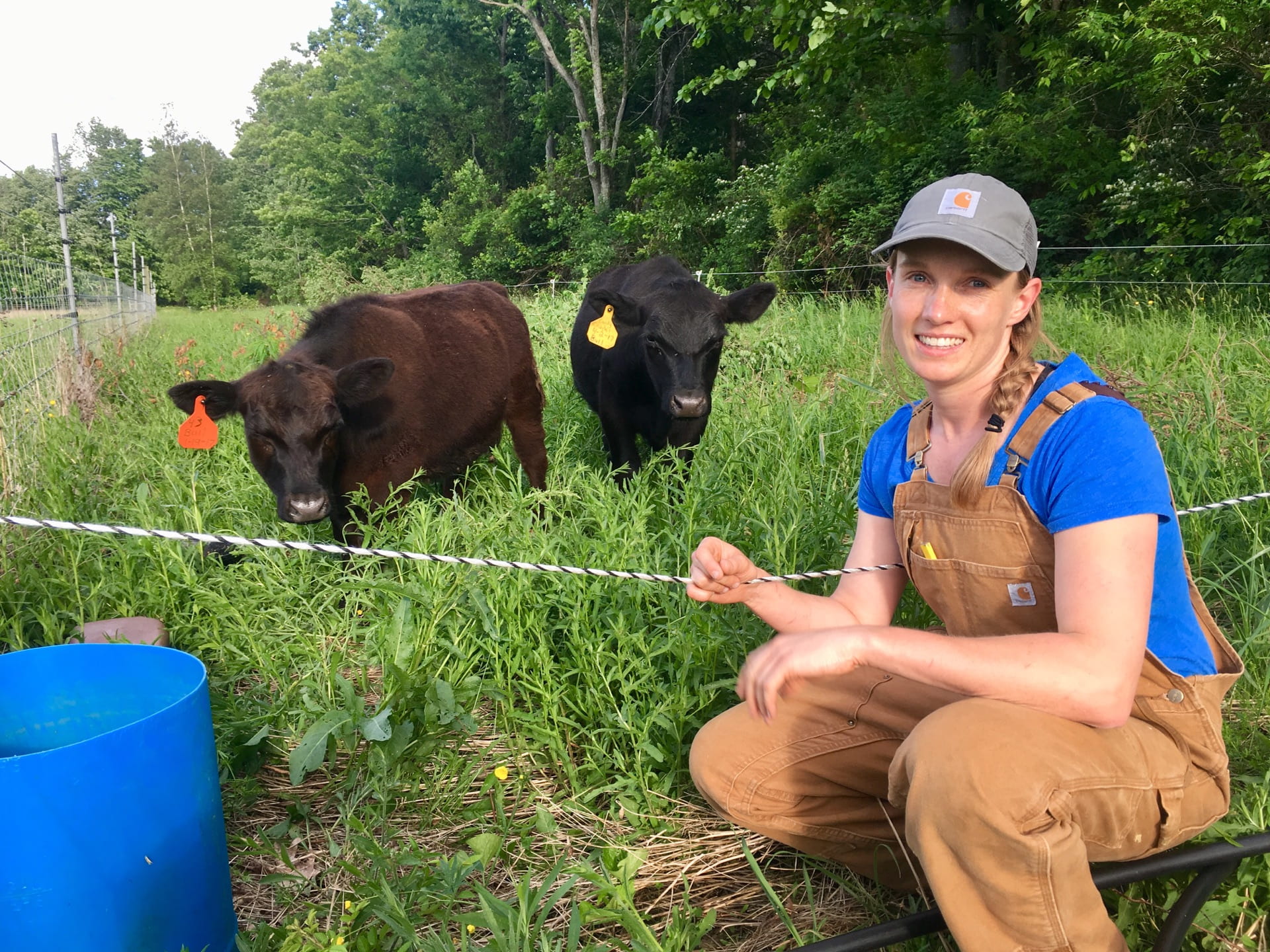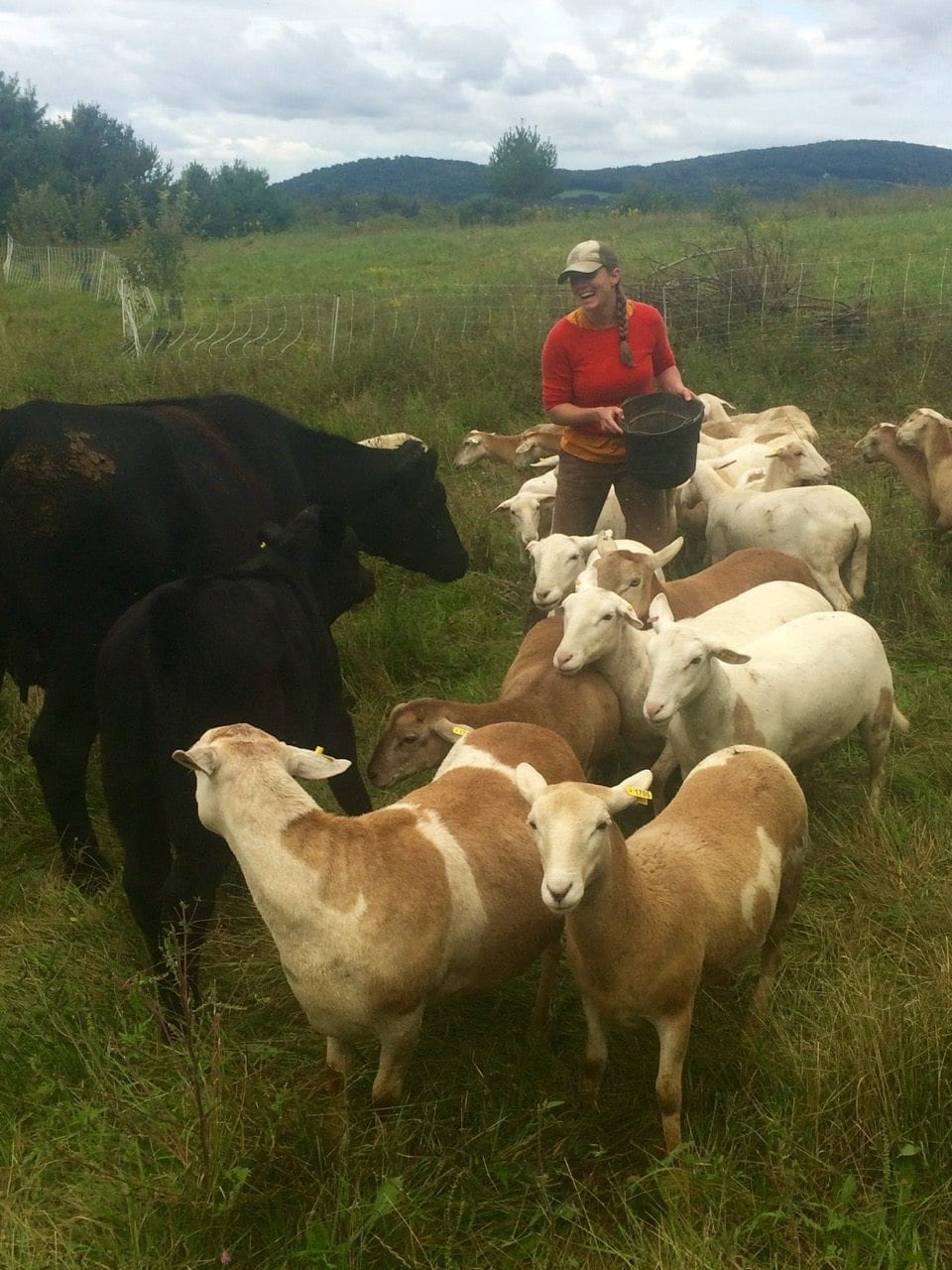From Dreaming to Doing: 5 Tips for Beginning Farmers
The number of young farmers is growing. These tips can help new farm businesses successfully navigate the startup stage.
Newly released data from the 2017 U.S. Census of Agriculture show an increase, for the second census in a row, in the number of farmers under the age of 35. A 2017 National Young Farmers Coalition survey found that a majority of young farmers are college educated, and many are first-generation farmers. Census data reveal that beginning farmers, with 10 or fewer years of farming experience, made up 27% of all U.S. producers in 2017.

On her own small farm (Alchemy Farm), Mary Kate continues to develop her skills in rotational grazing with a goal of using cattle to improve soil health and forage quality in her pastures. Courtesy of Amy Fleischer
What advice would you give to this growing group of well-educated yet relatively inexperienced women and men looking to forge their own pathways into farming? Here are my top five considerations for beginning farmers. This list draws from well-established business best practices, plus my own successes and failures working to build a small farm business, as well as personal observations from working with dozens of first-generation farmers.
This list is also backed up by my own personal experience launching a small farm business, quickly failing, slowly recovering, and ultimately trying again with a very different approach. I wish someone had pounded these ideas into my head the first time around, and forced me to think through (and write down) answers to all the hard questions before I got too far along. While these tips are critical for beginners, they may also be good reminders for more experienced agricultural entrepreneurs.
- Get clear on your goals and abilities.Why do you want to farm? Are there other ways that you could achieve your goals with less risk or less effort?
If you aspire to work outdoors with plants, animals or machinery, why not get a job with an existing agricultural business? If you dream about the self-sufficiency of growing your own food and pursuing a rural lifestyle, perhaps approaching farming as hobby would be appropriate.
Can you identify a burning consumer need that your farm business is uniquely suited to fulfill? Congratulations, now you’re thinking like an entrepreneur! As you develop your big idea, take time to create and practice an “elevator pitch” so you can explain your farm business concept in less than 60 seconds to someone who knows next to nothing about agriculture.
Before you dive into farming, reflect on what competencies you are lacking, and on how you will address those deficiencies. Working for a successful farm operation (or several) can be a wonderful way to build skills and experience, and give you a head start in your own business development.
- Develop a business model. Once you have developed a big idea, you need to analyze it from all possible angles. If you will be selling any agricultural products at all — even if you plan to start at a small scale — you need to consider and plan for all the various functions of a business. The three primary functions you need to address are operations, marketing, and finance. Writing down your plan for each of these areas will help you to think critically and identify weaknesses.

Implementing best practices for record keeping and farm business accounting from the start lays a foundation for data-driven management decisions later on. Here, Mary Kate helps farmer Jon Ryan, of Ryan Apiaries, record end of year inventory values. Courtesy of Emma Mullen.
A farm operations plan should describe your production system, including all inputs, outputs, and processes for transforming inputs into outputs. Identify your primary input suppliers, to demonstrate that a supply chain exists to support your production system. Consider transportation and storage needs. Educate yourself about local, state, and federal regulations that may affect your business, and discuss what steps you will take to comply.
A marketing plan describes your target market and their critical need that your business is uniquely positioned to meet. This section should explain how you will approach the 4 P’s of marketing — product design, placement, pricing, and promotion — to reach your specific target market. This applies regardless of whether you are selling your product to the end consumer, or to a wholesaler or other intermediary buyer.
A financial plan should answer the following questions: What is the projected scale of your business in 3, 5 or 10 years? Will the business be profitable at that scale? How long will it take make a profit, and how will you fund the startup phase? How much will you, the owner, take out of the business to support your cost of living?
- Keep business and personal finances separate.Before you spend a penny on the farm business, open a new checking account for all of your farm transactions. To open a business checking account, you will first need to visit the county clerk’s office and file a DBA form to register your business name. Having separate personal and business checking accounts will make it easier to distinguish between farm and non-farm expenses, which is critical for accurate record keeping.
- Dream big, but also manage risk and plan for failure.Farming is an incredibly risky venture, and it takes a colossal investment of time and money to get started. Minimize your financial risk as much as possible by financing the business from savings or business earnings, rather than debt. Grow slowly. Live frugally. Be prepared to keep an off-farm job for years until the business is large enough and stable enough to support you.
Consider starting your business on rented land. Renting is almost always cheaper and less risky than buying. Plus, you can gain experience to know exactly what you will need if you decide to buy land in the future. Develop a sound lease agreement to protect your access to rented land and any investments you make in a rented property.
Have an exit plan from the very beginning. What happens if the business doesn’t work out, or if you decide to downgrade it to hobby status? What happens if you have an unexpected medical emergency? How quickly can you liquidate your farm business assets, and how much are they worth? Having a plan for your worst case scenario can help to take some of the pressure off, and reduce the stresses of navigating the startup stage.
- Relationships are key. Connect with other farmers, extension agents, and agricultural service providers in your community. Building relationships with other producers, especially older generations, can be incredibly valuable and satisfying for all parties.

Working with other farmers is a great way to get started in agriculture. Mary Kate spent a summer as a part-time intern at Shelterbelt Farm before starting her own grazing operation. Courtesy of Erica Frenay.
Ask lots of questions, not just about production, but especially about finances. Be generous in supporting other farm businesses in your community. Establishing strong ties with the agricultural community will give you access to resources for support and information. A solid social network can help you make better decisions and grow your farm business faster.
Source for more info:
If farming sounds like the right direction for you, check out the many resources on the Cornell Small Farms Program website. Their website offers a variety of technical resourceson topics ranging from establishing your production system, to navigating regulations, to farm business planning.
Resource Spotlight:
The National Young Farmers Coalition educates and advocates for young and aspiring farmers and ranchers. For a review of challenges facing young people in agriculture today, and policy recommendations to address those challenges, check out the 2017 NYFC publication “Building a Future with Farmers II: Results and Recommendations from the National Young Farmer Survey.” This report identifies land access as the number one obstacle that young farmers face. In response, NYFC offers resources, trainings, and decision-making tools to help young farmers and ranchers secure access to productive farmland.
Reprint Info?
A version of this article was originally published on the South Central NY Dairy and Field Crops Team blog and in the team’s April 2019 Dairy Digest newsletter.


I like how you mentioned that you should get a checking account for all farm transactions before spending money on business expenses. My brother is thinking of looking for farm insurance because he’s considering getting some cattle to breed and raise on his land and sell them to potential buyers. I think it’s a good idea for my brother to consider getting insured from a reputable agency that can protect his investment if he decides to breed the cattle.
I absolutely find this useful… will have to do lot of thinking based on your provided informations. Thanks. God bless
I found these five tips very helpful especially when you want to navigate through the startup stage. I have learned what to consider before you even start to invest in your farming venture. Comments about exit plan are very critical and important to consider before you begin.
I want to be a farm. I want to increase a food security. I want to decrease a poverty in my community.
Where are you located?
This is a very helpful article. Thank you. I am also a new female farmer looking for more female farm help. We have goats, chickens, dogs, and a kitten on a mini no kill animal sanctuary and forest preserve in the foothills of the Sierras, Northern California.
Please email me at:
love4farmersmarkets@gmail.com
if you want to help with our mission of sustainable off-grid living.
Although technological advancements have made agriculture a bit easier but it still remains amongst the toughest profession even in such modern times.
Absolutely very helpful information, thanks so much for the info. Only that having investors for farmers in developing countries like Uganda may be more useful and increase farming in young people.
I like how you pointed out that opening a bank account is a good idea before paying for any farm-related costs. Because he’s considering purchasing some cattle to breed and grow on his property and sell to possible customers, my brother is considering looking for a livestock breeder. I believe it would be wise for my brother to think about searching for one a reliable person or organization.
It’s true that farming is a very dangerous endeavor that requires a huge initial time and financial investment. I can understand how funding the firm through savings or business earnings rather than debt can help you reduce your financial risk as much as feasible. steadily expand. I had to transmit this right away to my in-laws, who had the guts to establish their cattle farm in a secluded rural region after leaving the luxurious life behind. I sincerely hope that they quickly locate On Property Bull Sales that they need to start their adventure.